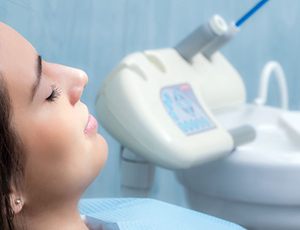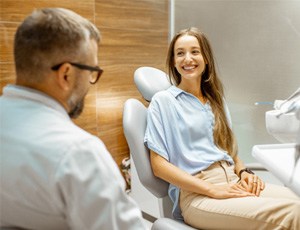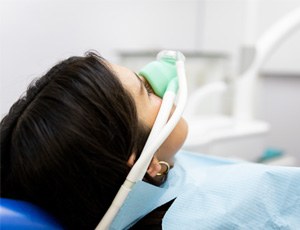Sedation Dentistry - Plano
Feel Genuinely Relaxed During Any Dental Care
Dental phobia is a very real thing, and every year, it prevents millions of people from receiving their essential dental care. If the thought of going to the dentist is enough to make the hair on the back of your neck stand on end, then our team knows exactly how to help. With sedation dentistry, we can take extra steps to make sure you always have relaxing dental appointments. These safe and effective techniques have been used for decades and continue to improve, and they may be just what you need to get the healthy, beautiful smile you deserve without the stress. To learn more about sedation dentistry in Plano, TX and how it can help you, contact us today.
Oral Conscious Sedation

If you experience mild to severe dental phobia, oral conscious sedation may be able to help those feelings go away. Your dentist will prescribe a pill for you to take about an hour before your visit so that by the time you sit in the treatment chair, you will be completely relaxed. You will still be awake, but time will fly by very fast, and you will likely have very little memory of your appointment afterward. Because of the strength of this method, we require that you have a friend or family member drive you to and from the dental office the day of your treatment.
What Is Oral Conscious Sedation?

Oral conscious sedation uses a sedative in pill form. No needles or masks are involved. We give you a prescription for a small pill, which you swallow shortly before your appointment is set to begin. Within 15 minutes or so, you should start to feel its effects. You can expect to be very relaxed and perhaps a little sleepy. The medications used for oral conscious sedation can vary, but Valium, Ativan, and Halcion are some of the most common.
How Does Oral Conscious Sedation Work?

Oral conscious sedation is quite powerful. It will make it unsafe for you to drive, so you should have a trusted adult ready to drive you to and from your appointment. Once the effects of the medication kick in, you will feel at ease. You might drift off to sleep, but it should remain easy for our team to awaken you. We will monitor you very closely throughout your appointment.
The effects of oral conscious sedation may linger for several hours after you leave our office, so you should make room in your schedule to get plenty of rest after you go home.
Are You a Good Candidate for Oral Conscious Sedation?

Oral conscious sedation might be a good fit for you if:
- You struggle with moderate to severe dental phobia.
- You have a sensitive gag reflex.
- You need to undergo multiple or complex procedures.
- You have had traumatic dental care experiences in the past.
- You are not easily numbed by local anesthesia.
- You do not have any serious contraindications for oral conscious sedation. For example, it is not considered safe for pregnant women or people with certain allergies.
Nitrous Oxide Sedation Dentistry

Oftentimes, nitrous oxide is referred to by another name: laughing gas. This calming solution has been used for over 100 years to help slightly nervous dental patients, and it’s so gentle that we can even use it with children! So, if you struggle with anxiety, stress, or worry surrounding preventive, restorative, or cosmetic care, don’t hesitate to get in touch with us to see if it’s right for you. You can also read on to learn more about nitrous oxide in the meantime.
Who is a Good Candidate for Nitrous Oxide?

As we mentioned above, nitrous oxide is mild, safe for patients of all ages, and has been used for over 100 years. So, if you are interested in adding it to your treatment plan, there’s a good chance that you’re a candidate! Of course, there are some exceptions. For example, if you have a condition that makes it difficult for you to breathe through your nose, like asthma, then we’ll need to find a different solution. Similarly, sedation dentistry isn’t recommended for expecting mothers, those who are allergic, and people with sinus congestion.
How Does Nitrous Oxide Work?

Administering nitrous oxide is easy. We’ll simply put the nasal mask in place and instruct you to breathe through your nose. After a few minutes of breathing in the colorless, odorless gas, you’ll feel a deep sense of relaxation. In fact, even though you won’t be put to sleep, you may doze off because you’re so calm. We can gently wake you if needed. Otherwise, we’ll let you continue to relax while we tend to your smile.
Aftercare for Nitrous Oxide

The nasal mask will stay on for your entire appointment, ensuring you remain in a calm, comfortable state. Once we’re finished providing the necessary preventive, restorative, or cosmetic care, we’ll switch off the nitrous. The effects will wear off almost instantly, so you don’t have to deal with lingering grogginess or arrange for someone to take you home from our office. Instead, you’ll be able to get back to your day immediately after your visit!
Sedation Dentistry FAQs
Is Sedation Dentistry Safe?
All told, sedation dentistry is an incredibly safe option for most patients. While there are risks involved with any sedative, we’re well-trained in the use of both nitrous oxide and oral conscious sedation, allowing us to help you circumvent many of the issues you could face.
Nitrous oxide sedation in particular is incredibly low-risk. We’re able to control the flow of gas completely throughout the procedure, allowing us to ensure a safe and effective dosage of the sedative. We’ll monitor your vitals closely throughout the procedure to ensure that you’re responding well to the drugs.
What Does it Feel Like to be Sedated at the Dentist?
Different sedatives produce slightly different responses. While each of them can help you to relax, the exact sensations you feel will vary a bit.
Nitrous oxide tends to make patients feel airy and light, and may be associated with a tingling sensation in the arms or legs. People also tend to get the giggles in response, which is why the sedative is often called “laughing gas.”
Oral conscious sedation is stronger than nitrous oxide. It often produces a “heavy” feeling, with patients often struggling to stay awake during their procedure. Even if you remain conscious, you may have the feeling that the time passed more quickly.
Is Sedation Dentistry Covered by Insurance?
Typically, sedation dentistry is considered to be purely elective. This means that insurance is unlikely to reimburse you for its cost.
There are, however, some possible exceptions. Patients with disabilities that make dental care impossible with sedatives, like autism or Parkinson’s, may sometimes be able to get their sedation covered due to its medical necessity. Sedation may also be covered in the case of exceedingly long procedures that aren’t practical without it.
Every plan is different, so we’ll usually help you consult with your insurance company to ensure that you’re getting all the coverage you can.
